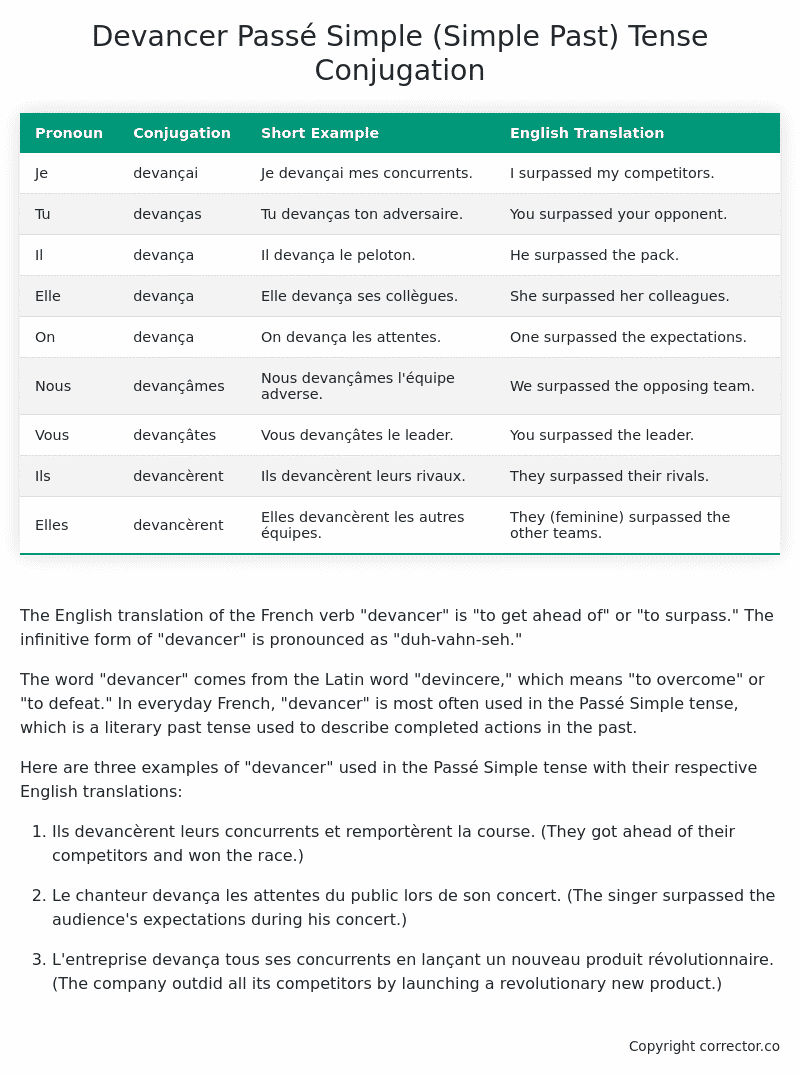Passé Simple (Simple Past) Tense Conjugation of the French Verb devancer
Introduction to the verb devancer
The English translation of the French verb “devancer” is “to get ahead of” or “to surpass.” The infinitive form of “devancer” is pronounced as “duh-vahn-seh.”
The word “devancer” comes from the Latin word “devincere,” which means “to overcome” or “to defeat.” In everyday French, “devancer” is most often used in the Passé Simple tense, which is a literary past tense used to describe completed actions in the past.
Here are three examples of “devancer” used in the Passé Simple tense with their respective English translations:
-
Ils devancèrent leurs concurrents et remportèrent la course.
(They got ahead of their competitors and won the race.) -
Le chanteur devança les attentes du public lors de son concert.
(The singer surpassed the audience’s expectations during his concert.) -
L’entreprise devança tous ses concurrents en lançant un nouveau produit révolutionnaire.
(The company outdid all its competitors by launching a revolutionary new product.)
Table of the Passé Simple (Simple Past) Tense Conjugation of devancer
| Pronoun | Conjugation | Short Example | English Translation |
|---|---|---|---|
| Je | devançai | Je devançai mes concurrents. | I surpassed my competitors. |
| Tu | devanças | Tu devanças ton adversaire. | You surpassed your opponent. |
| Il | devança | Il devança le peloton. | He surpassed the pack. |
| Elle | devança | Elle devança ses collègues. | She surpassed her colleagues. |
| On | devança | On devança les attentes. | One surpassed the expectations. |
| Nous | devançâmes | Nous devançâmes l’équipe adverse. | We surpassed the opposing team. |
| Vous | devançâtes | Vous devançâtes le leader. | You surpassed the leader. |
| Ils | devancèrent | Ils devancèrent leurs rivaux. | They surpassed their rivals. |
| Elles | devancèrent | Elles devancèrent les autres équipes. | They (feminine) surpassed the other teams. |
Other Conjugations for Devancer.
Le Present (Present Tense) Conjugation of the French Verb devancer
Imparfait (Imperfect) Tense Conjugation of the French Verb devancer
Passé Simple (Simple Past) Tense Conjugation of the French Verb devancer (You’re reading it right now!)
Passé Composé (Present Perfect) Tense Conjugation of the French Verb devancer
Futur Simple (Simple Future) Tense Conjugation of the French Verb devancer
Futur Proche (Near Future) Tense Conjugation of the French Verb devancer
Plus-que-parfait (Pluperfect) Tense Conjugation of the French Verb devancer
Passé Antérieur (Past Anterior) Tense Conjugation of the French Verb devancer
Futur Antérieur (Future Anterior) Tense Conjugation of the French Verb devancer
Subjonctif Présent (Subjunctive Present) Tense Conjugation of the French Verb devancer
Subjonctif Passé (Subjunctive Past) Tense Conjugation of the French Verb devancer
Subjonctif Imparfait (Subjunctive Imperfect) Tense Conjugation of the French Verb devancer
Subjonctif Plus-que-parfait (Subjunctive Pluperfect) Tense Conjugation of the French Verb devancer
Conditionnel Présent (Conditional Present) Tense Conjugation of the French Verb devancer
Conditionnel Passé (Conditional Past) Tense Conjugation of the French Verb devancer
Conditionnel Passé II (Conditional Past II) Tense Conjugation of the French Verb devancer
L’impératif Présent (Imperative Present) Tense Conjugation of the French Verb devancer
L’impératif Passé (Imperative Past) Tense Conjugation of the French Verb devancer
L’infinitif Présent (Infinitive Present) Tense Conjugation of the French Verb devancer
L’infinitif Passé (Infinitive Past) Tense Conjugation of the French Verb devancer
Le Participe Présent (Present Participle) Tense Conjugation of the French Verb devancer
Le Participe Passé (Past Participle) Tense Conjugation of the French Verb devancer
Struggling with French verbs or the language in general? Why not use our free French Grammar Checker – no registration required!
Get a FREE Download Study Sheet of this Conjugation 🔥
Simply right click the image below, click “save image” and get your free reference for the devancer Passé Simple tense conjugation!

Devancer – About the French Passé Simple (Simple Past) Tense
Formation
Usage
Narration
Historical Context
Interactions with other tenses
Passé Composé
Imparfait
Conditional and Subjunctive
Summary
I hope you enjoyed this article on the verb devancer. Still in a learning mood? Check out another TOTALLY random French verb conjugation!


